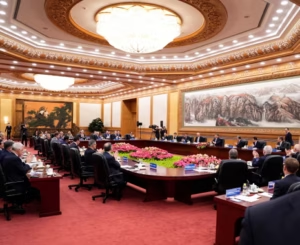China’s President Xi Jinping encouraged a meeting of global CEOs on Friday to defend industrial and supply chains, as Beijing strives to allay international firms’ fears about the Chinese economy’s health, while President Trump threatens additional tariffs.
Beijing has tried to allay concerns that a fresh trade battle with US President Donald Trump could further stifle development in the world’s second-largest economy, which has recovered slowly since the end of the Covid-19 outbreak.
Longstanding concerns about China’s tightening restrictions, abrupt crackdowns on foreign firms, and an unequal playing field that favors state-owned Chinese corporations are also dampening business optimism.
Approximately 40 executives attended the meeting, the majority of whom represented the pharmaceutical industry.

The conference lasted just over 90 minutes, and seven companies were invited to speak, according to a source with firsthand knowledge of the planning.
The CEOs sat in a horseshoe formation, with Mercedes-Benz CEO Ola Kallenius and FedEx’s Raj Subramaniam sitting immediately across from Mr. Xi.
HSBC CEO Georges Elhedery, SK Hynix CEO Kwak Noh-jung, Saudi Aramco president and CEO Amin Nasser, and Hitachi chairman Toshiaki Higashihara were also in the first row.
In 2024, Mr Xi met with American business leaders after the China Development Forum, prompting questions about whether China’s top leader meeting members of the global business community a few days after the annual business forum would become an annual fixture.
China’s second-ranking premier used to meet them to the CDF’s side-lines.

“The essence of China-US economic and trade relations is mutually beneficial and win-win,” Mr Xi told the attendees of the 2025’s meeting.
Mr Trump has proposed a new round of “reciprocal” tariffs, which will go into force on April 2 and target nations that have trade obstacles to US imports, including China.
He put 20% tariffs on Chinese goods in March, forcing China to counter with further taxes on American agricultural items.
The number of meetings between international executives and high-level Chinese officials has increased in the last month, following government data showing that foreign direct investment fell 27.1% year on year in local currency terms in 2024.
This was the greatest reduction in FDI since the 2008 global financial crisis.





